Knowledge Mining
Karl Ho
School of Economic, Political and Policy Sciences
University of Texas at Dallas
Introduction
Illustration: Dimensionality of data
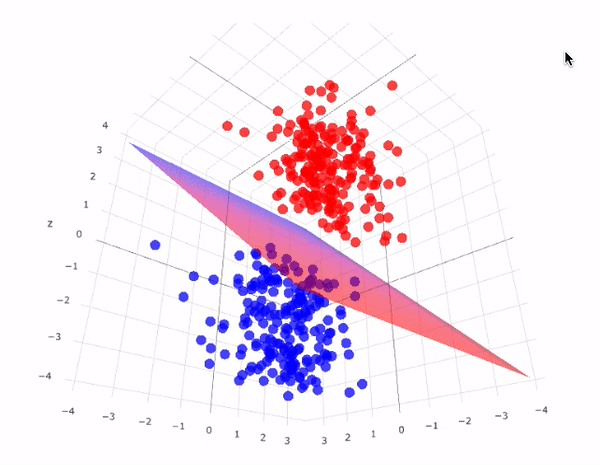
Illustration: Support Vector Machines
Overview
-
What is Knowledge Mining?
-
Knowledge Discovery + Data Mining
-
Statistics and Machine Learning
-
-
Statistical modeling: the two cultures
-
Conventional statistical methods and machine learning
-
Statistical/Machine Learning methods
What is Knowledge Mining?
-
Knowledge Discovery + Data Mining
-
Wei et al. (2003):
-
Knowledge discovery refers to the overall process of discovering useful knowledge from data
-
Data mining refers to the extraction of patterns from data.
-
What is Knowledge Mining?
-
Knowledge discovery can be performed on structured databases
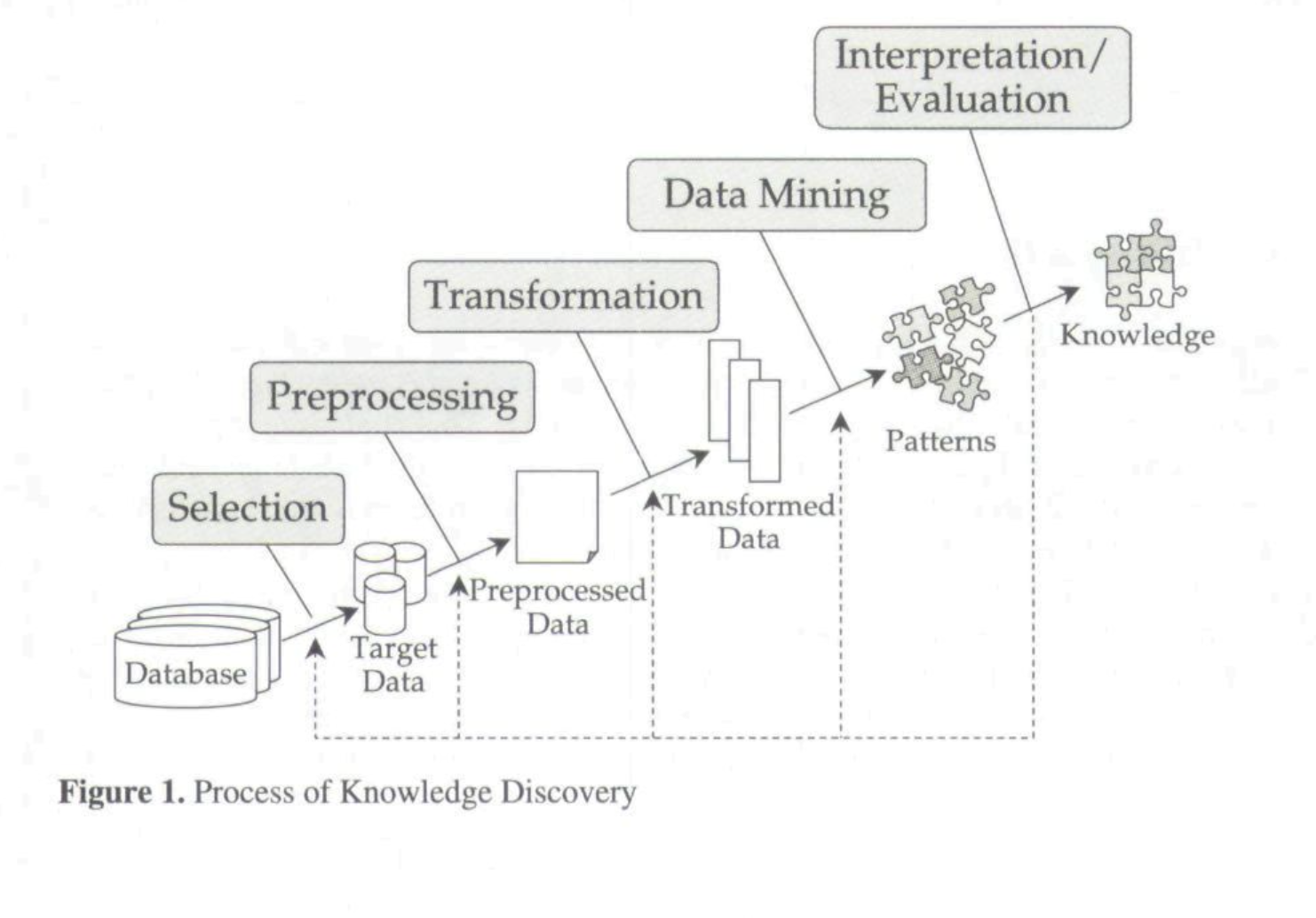
Source: Wei, Chih-Ping, Selwyn Piramuthu, and Michael J. Shaw. "Knowledge discovery and data mining." In Handbook on Knowledge Management, pp. 157-189. Springer, Berlin, Heidelberg, 2003.
What is Knowledge Mining?
-
Data mining generally refers to the methods or techniques used to identify the patterns in data,
-
It can be broadly structured into several categories:
-
classification
-
clustering
-
dependency analysis
-
text mining
-
What is Knowledge Mining?
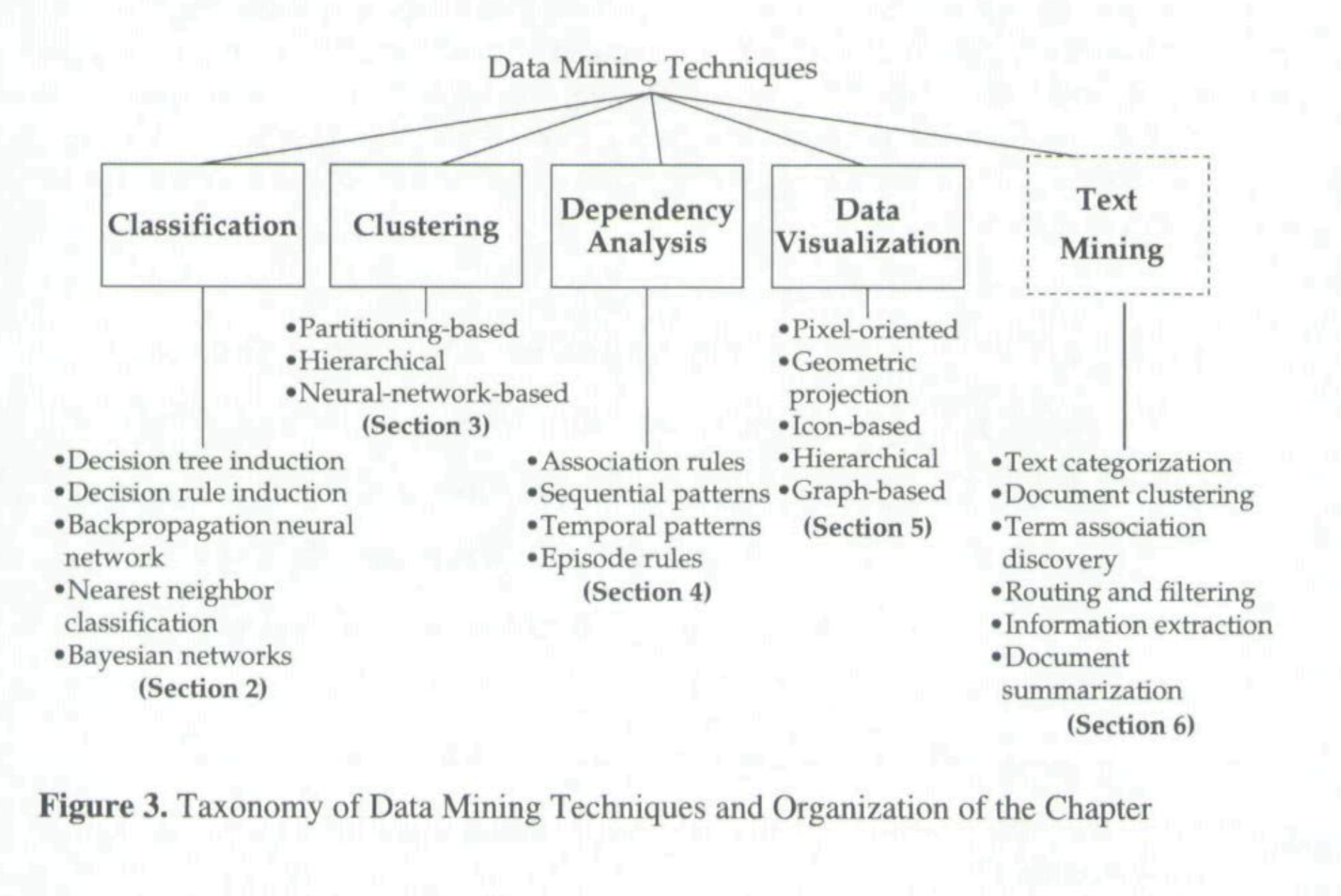
Source: Wei, Chih-Ping, Selwyn Piramuthu, and Michael J. Shaw. "Knowledge discovery and data mining." In Handbook on Knowledge Management, pp. 157-189. Springer, Berlin, Heidelberg, 2003.
What is Knowledge Mining?
-
Both classes of methods are subsumed under Machine Learning now
-
More generally under Unsupervised Machine Learning
-
Pattern recognition
-
Group/class identication
-
Hypothesis formation (vs. Hypothesis confirmation)
-
Bonferroni's principle
(roughly) if you look in more places for interesting patterns than your amount of data will support, you are bound to find crap.
- Rajaraman A., Leskovec J. and Ullman J. Mining of Massive Datasets
Today we live in a data rich, information driven, knowledge strained, and wisdom scant world.
- Graham Williams 2021
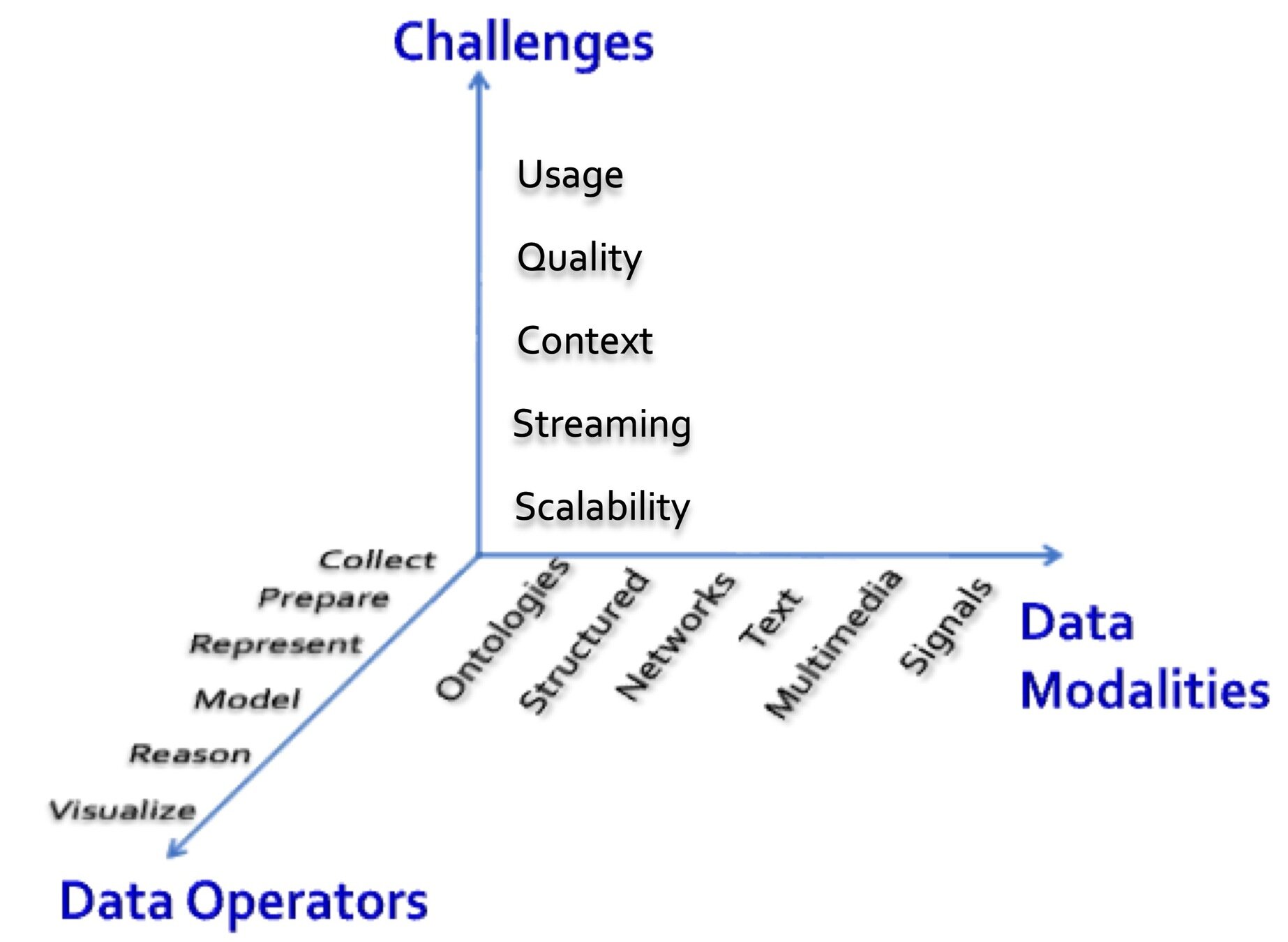
- Rajaraman A., Leskovec J. and Ullman J. Mining of Massive Datasets
Data mining overlaps with:
- Databases: Large-scale data, simple queries
- Machine learning: Small data, Complex models
- CS Theory: (Randomized) Algorithms
Different cultures:
- To a Database person, data mining is an extreme form of analytic processing – queries that examine large amounts of data
- Result is the query answer
- To a Machine Learning person, data-mining is the inference of models
- Result is the parameters of the model
Data Mining and Machine Learning
- association rules
- recursive partitioning or decision trees, including CART (classification and regression trees) and CHAID (chi-squared automatic interaction detection), boosted trees, forests, and bootstrap forests
- multi-layer neural network models and “deep learning” methods
- naive Bayes classifiers and Bayesian networks
- clustering methods, including hierarchical, k-means, nearest neighbor, linearand nonlinear manifold clustering
- support vector machines
- “soft modeling” or partial least squares latent variable modeling
Data Mining methods
What is machine learning?
Field of study that gives computers the ability to learn without being explicitly programmed.
- Arthur Samuel 1959

A computer can be programmed so that it will learn to play a better game of checkers than can be played by the person who wrote the program.
Programming computers to learn from experience should eventually eliminate the need for much of this detailed programming effort.
What is machine learning?
The ultimate goal of data modeling is to explain and predict the variable of interest using data. Machine learning is to achieve this goal using computer algorithms in particular to make the prediction and solve the problem.

Source: Tom Mitchell website
According to Carnegie Mellon Computer Science professor Tom M. Mitchell,
"Machine learning is the study of computer algorithms that allow computer programs to automatically improve through experience."
What is machine learning?
“A computer program is said to learn from experience E with respect to some class of tasks T and performance measure P if its performance at tasks in T, as measured by P, improves with experience E.”

Source: Tom Mitchell website
Study the past if you would define the future.
– Confucius
Tom Mitchell. 1997. Machine Learning, McGraw Hill.
What is machine learning?
Machine learning is a science of the artificial. The field's main objects of study are artifacts, specifically algorithms that improve their performance with experience.
- Langley, 1996
Machine learning is programming computers to optimize a performance criterion using example data or past experience.’
- Alpaydin, 2004
What is machine learning?
Machine learning is an area of artificial intelligence concerned with the study of computer algorithms that improve automatically through experience. In practice, this involves creating programs that optimize a performance criterion through the analysis of data.
- Sewell, 2006
What is machine learning?
To statisticians, the “improve through experience” part is the process of validation or cross validation. Learning can be done through repeated exercises to understand data.
What is machine learning?
Machine learning involves having computer or statistics programs do repeated estimations, like human learns from experience and improve actions and decisions. This is called the training process in machine learning.
Statistics, Knowledge Mining and Machine Learning
Statistics refresher
Statistics:
- Find and test data (data production and collection)
- Made data (surveys, experiments, interviews) based on theory and hypotheses
- Found data (web data, social data, machine generated data) from all sources
- Make data ready for analysis (data management)
- Explore data (means, variances, distribution) - Descriptive statistics
- Explain data (correlation, cross-tabulation, regression) - Inferential statistics
Parametric vs. Non-parametric models
-
Sample and population
-
Generalization
-
Representation
Leo Breiman
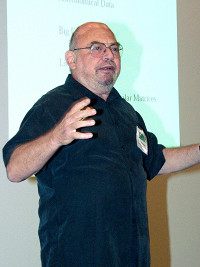
1928 – 2005
-
Statistical Modeling: The Two Cultures
-
CART (Classification and Regression Trees)
What can Machine Learning do and do better?
Machine Learning can do:
- Prediction
- Classification
- Give useful information for problem solving and decision making
Machine Learning and Conventional statistical methods
-
Statistics: testing hypotheses
-
Machine learning: finding the right hypothesis
-
Overlap:
Decision trees (C4.5 and CART)
Nearest-neighbor methods -
Bridging the two:
Most machine learning algorithms employ statistical techniques
Statistical Modeling:
The Two Cultures
Leo Breiman 2001: Statistical Science
| One assumes that the data are generated by a given stochastic data model. |
|---|
| The other uses algorithmic models and treats the data mechanism as unknown. |
|---|
| Data Model |
|---|
| Algorithmic Model |
|---|
| Small data |
|---|
| Complex, big data |
|---|
Theory:
Data Generation Process
Data are generated in many fashions. Picture this: independent variable x goes in one side of the box-- we call it nature for now-- and dependent variable y come out from the other side.

Theory:
Data Generation Process
Data Model
The analysis in this culture starts with assuming a stochastic data model for the inside of the black box. For example, a common data model is that data are generated by independent draws from response variables.
Response Variable= f(Predictor variables, random noise, parameters)
Reading the response variable is a function of a series of predictor/independent variables, plus random noise (normally distributed errors) and other parameters.
Theory:
Data Generation Process
Data Model
The values of the parameters are estimated from the data and the model then used for information and/or prediction.

Theory:
Data Generation Process
Algorithmic Modeling
The analysis in this approach considers the inside of the box complex and unknown. Their approach is to find a function f(x)-an algorithm that operates on x to predict the responses y.
The goal is to find algorithm that accurately predicts y.
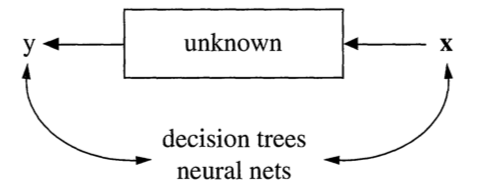
Theory:
Data Generation Process
Algorithmic Modeling
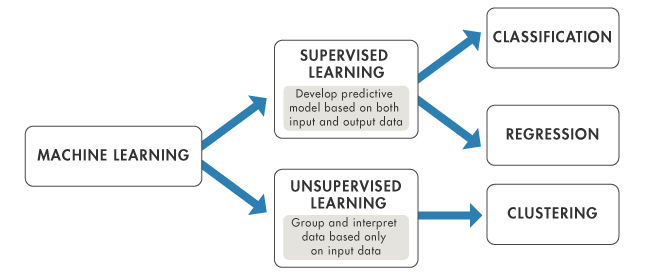
Source: https://www.mathworks.com
Machine Learning and Conventional statistical methods

Source: Attewell, Paul A. & Monaghan, David B. 2015. Data Mining for the Social Sciences: an Introduction, Table 2.1, p. 27
Machine learning methods
| Regression | Classification | Clustering | Q-Learning |
| Linear regression | Logistic regression | - K-Means Clustering | State Action Reward State Action (SARSA) |
| Polynomial regression | K-Nearest Neighbors | - Hierarchical Clustering | Deep Q-Network |
| Support vector regression | Support Vector Machines | Dimensionality Reduction | Markov Decision Processes |
| Ridge Regression | Kernal Support Vector Machines | Principal Component Analysis | Deep Deterministic Policy Gradient (DDPG) |
| Lasso | Naïve Bayes | Linear Discriminant Analysis | |
| ElasticNet | Decision Tree | Kernal PCA | |
| Decision tree | Random forest | ||
| Random forest |
| Supervised Learning | Unsupervised Learning | Reinforcement Learning |
|---|
Machine Learning and Conventional statistical methods
-
Statistics: testing hypotheses
-
Machine learning: finding the right hypothesis
-
Overlap:
Decision trees (C4.5 and CART)
Nearest-neighbor methods -
Bridging the two:
Most machine learning algorithms employ statistical techniques
Wickham and Grolemund: Data analytics:
-
Hypothesis generation
-
Hypothesis confirmation
Which one goes first?
Trevor Hastie and Robert Tibshirani




Bradley Efron and Trevor Hastie



Judea Pearl and Dana MacKenzie
